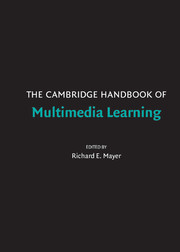Book contents
- Frontmatter
- Contents
- Preface
- Contributors
- 1 Introduction to Multimedia Learning
- PART I THEORETICAL FOUNDATIONS
- PART II BASIC PRINCIPLES OF MULTIMEDIA LEARNING
- PART III ADVANCED PRINCIPLES OF MULTIMEDIA LEARNING
- PART IV MULTIMEDIA LEARNING IN CONTENT AREAS
- 23 Multimedia Learning of Reading
- 24 Multimedia Learning of History
- 25 Multimedia Learning of Mathematics
- 26 Multimedia Learning of Chemistry
- 27 Multimedia Learning of Meteorology
- 28 Multimedia Learning About Physical Systems
- 29 Multimedia Learning in Second Language Acquisition
- 30 Multimedia Learning of Cognitive Skills
- PART V MULTIMEDIA LEARNING IN ADVANCED COMPUTER-BASED CONTEXTS
- Author Index
- Subject Index
- References
30 - Multimedia Learning of Cognitive Skills
Published online by Cambridge University Press: 05 June 2012
- Frontmatter
- Contents
- Preface
- Contributors
- 1 Introduction to Multimedia Learning
- PART I THEORETICAL FOUNDATIONS
- PART II BASIC PRINCIPLES OF MULTIMEDIA LEARNING
- PART III ADVANCED PRINCIPLES OF MULTIMEDIA LEARNING
- PART IV MULTIMEDIA LEARNING IN CONTENT AREAS
- 23 Multimedia Learning of Reading
- 24 Multimedia Learning of History
- 25 Multimedia Learning of Mathematics
- 26 Multimedia Learning of Chemistry
- 27 Multimedia Learning of Meteorology
- 28 Multimedia Learning About Physical Systems
- 29 Multimedia Learning in Second Language Acquisition
- 30 Multimedia Learning of Cognitive Skills
- PART V MULTIMEDIA LEARNING IN ADVANCED COMPUTER-BASED CONTEXTS
- Author Index
- Subject Index
- References
Summary
Abstract
Examples of multimedia learning situations using technology are described from the perspective of enhancing cognition. Implications for instructional designers are provided along with some future directions for this field of research. We see a need for multimedia research to foster higher degrees of interactivity with more varied types of media. More importantly, such research requires the inclusion of more scaffolding of learners, more attention to assisting learners in self-regulation, and perhaps media that serves in a pedagogical manner through coaching, pedagogical agents, and realistic environments that may include virtual reality dimensions. This new generation of multimedia will focus more on active knowledge construction through performing or doing some task with guidance.
Introduction to Multimedia Learning of Cognitive Skills
In examining the mores of today's society one cannot help but notice that higher demands are placed on an individuals' processing capability. In fact, daily expectations exist for people to attend and respond to multiple forms of information efficiently. Multimedia learning refers to the ability to learn from multiple representations, in particular, verbal and visual representations that are used to present an instructional message (Mayer, 2003). Verbal representations are defined as text, spoken or written, and visual representations as pictures, static or dynamic. Other researchers have extended this definition to include descriptions of the different functions multiple representations play in learning, that is, complementing or constraining learning, or helping learners to construct new knowledge (Ainsworth, 1999).
- Type
- Chapter
- Information
- The Cambridge Handbook of Multimedia Learning , pp. 489 - 504Publisher: Cambridge University PressPrint publication year: 2005
References
- 7
- Cited by

